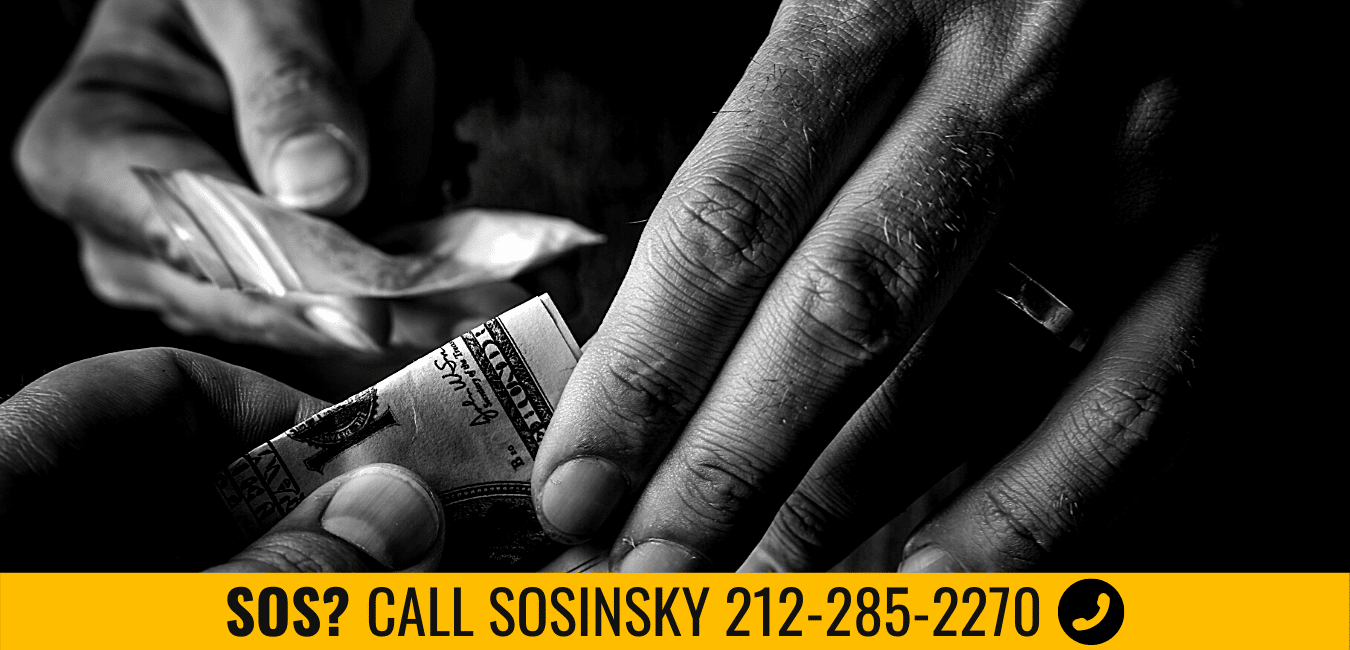NYC Drug Possession Lawyer
Have You Been Arrested on Drug Charges in NYC?
Despite its reputation as a progressive state, New York still treats drug possession very seriously. Being convicted of a drug charge or as it’s referred to in New York, possession of a controlled substance can lead to a lengthy prison term as well as many other non-criminal consequences that may impact your life for a very long time. In some cases, there are even mandatory minimum sentences that may come into play. Thus, despite all of the supposed rethinking about mass incarceration, alternatives to imprisonment, and substance abuse treatment for those convicted of non-violent drug offenses, in New York, sadly, many individuals convicted of narcotics-related crimes end up in jail or state prison. To give yourself the best chance of avoiding that fate, get in touch with the highly-respected NYC drug possession lawyer, Fred Sosinsky.
If you or a loved one is facing criminal possession of a controlled substance in New York there are few NYC drug possession lawyers with more high-level experience and consistent success than Fred Sosinsky. For more than three decades, Fred has regularly represented clients accused of criminal possession of a controlled substance in New York courts. Whether the case involves simple possession of cocaine, unlawful possession of marijuana, Oxycodone, or any other controlled substance, or a seizure of thousands of kilograms of heroin, fentanyl, or other substances. NYC drug lawyer Fred Sosinsky will provide expert representation to you. Fred has been counsel to clients in cases involving the largest heroin seizures in New York State history and in other major narcotics cases. Regardless of the drug or quantity involved, Fred Sosinsky will put his talents to work for you.
Fred has years of trial victories in narcotics cases. He has succeeded in having kilo quantity evidence suppressed or thrown out of court due to unlawful police searches and seizures. Fred has regularly worked out very favorable plea deals for his clients where the evidence of guilt was overwhelming and a trial was not the smart option. NYC Drug Crime Lawyer Fred Sosinsky has had scores of possession of controlled substance cases in New York dismissed.
Fred Sosinsky also is deeply aware that a conviction in a drug possession case can lead to life-altering collateral consequences regardless of the sentence imposed. These can include devastating immigration consequences, potential loss of a job or career, professional license or certification discipline, ineligibility for student financial aid, loss of public housing, and many other disqualifications. With these non-criminal ramifications in mind, Fred will work with you to pave a path towards a result that best eliminates or mitigates these critical issues.
If the police have charged you with possessing drugs in New York, NYC drug possession attorney Fred Sosinsky will work tirelessly to win the case or to get you the very best possible resolution. His track record against drug charges in New York – and his former clients — speak for themselves.
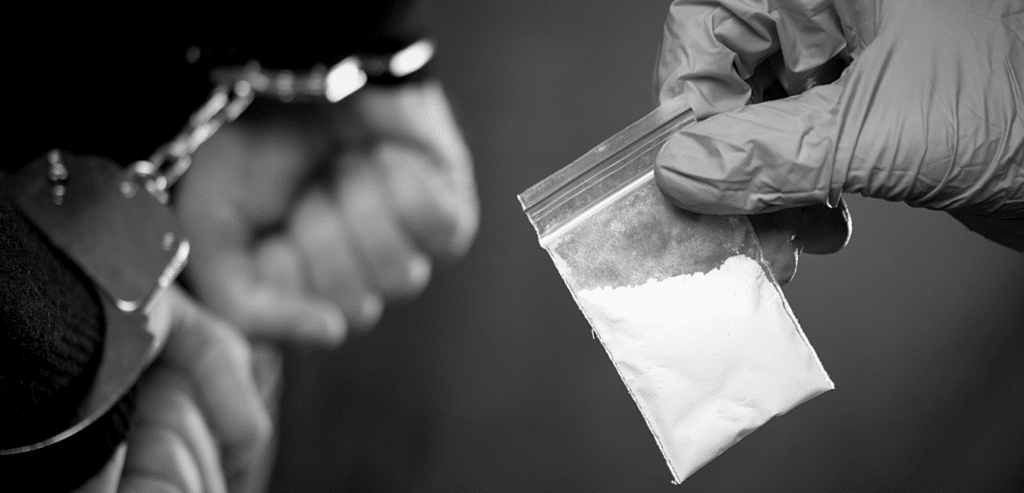
Criminal Possession of a Controlled Substance in New York
In New York, it is a crime to possess any controlled substance. A controlled substance generally consists of two types of drugs. The first are those that are illegal to have under any circumstances. These include drugs like heroin, cocaine, methamphetamines, and other drugs that cannot be prescribed by a physician for medical usage and are highly addictive and subject to abuse. The second are those that are unlawful to possess if one has not been prescribed these medications by a duly licensed provider. They include such medications as xanax, valium, oxycontin, oxycodone, and many other pharmacy dispensed substances.
Like its federal counterpart, New York law contains Schedules or tables of substances that are listed or “controlled.” Those substances that appear on Schedule I, the first of five schedules, are drugs that have no recognized medical purpose and are highly addictive. The drugs that appear in the other four Schedules reportedly decrease in their potential for addiction and abuse and may under certain circumstances have accepted medical uses. Luckily, Fred represents federal drug possession cases as well.
The severity of the charge for criminal possession of a controlled substance in New York is largely dependent on three things: the type of drug in question, the amount or quantity of the substance seized, and the presence of other evidence at the place of seizure which indicates that the drugs were possessed for the purpose of selling them. Depending upon these factors, the crime can be charged as a misdemeanor or increasingly serious felony offenses.
Criminal Possession of a Controlled Substance in the Seventh Degree
Criminal possession of a controlled substance in the seventh degree is the lowest level drug charge for a person accused of criminal possession of a controlled substance in New York State. It is a Class A misdemeanor offense punishable by up to one year in jail for a person to knowingly and unlawfully possess any quantity of any controlled substance. Thus, even the presence in a lab test of a minuscule quantity of crack, cocaine, or any other drug, referred to sometimes as a “trace amount” may suffice to establish the guilt of this crime. Typically, people arrested for this offense are those who, following an encounter with the police, have their persons, vehicles or residences searched by law enforcement for some reason or are claimed to have been observed making a purchase of the drug from a street dealer and are then searched.
For those facing seventh-degree drug charges in New York, especially if it is your first arrest, NYC drug possession lawyer Fred Sosinsky may be able to have the charges reduced from a criminal offense to a non-criminal violation which leaves one with no criminal record. He may also be able to gain dismissal either outright or with what is called an ACD or adjournment in contemplation of dismissal whereby the matter is dismissed and sealed after 6 months. If an ACD is possible, you may have to perform community service and/or attend a brief remedial program.
Criminal Possession of a Controlled Substance in the Fifth Degree
Criminal Possession of a Controlled Substance in the Fifth Degree is a Class D felony offense punishable by up to two and one-half years in prison. You may be charged with this crime if you knowingly and unlawfully possess any controlled substance other than marijuana but including concentrating cannabis, with the intent to sell that substance, or if you possess relatively small amounts of controlled substances such as depressant “date rape” or “rave” drugs such as ketamine, ecstasy or GHB; or possess 500 mg or more of cocaine.
Since this charge of Fifth Degree Criminal Possession of a Controlled Substance is brought most often based upon claims that the drugs were possessed “with intent to sell” them, it is usually the case that prosecutors rely upon the alleged presence of drug packaging, paraphernalia, cash or records at the scene of a drug search to make the charge stick. This charge does not require that police have direct evidence that any sale of drugs to an undercover officer or informant or to any other person actually took place. The intent to sell is claimed to be based upon circumstantial evidence at the scene. And, as you can see, intent to sell is what elevates what might otherwise be but a misdemeanor to a far more serious felony offense.
Criminal Possession of a Controlled Substance in the Fourth Degree
Criminal Possession of a Controlled Substance in the Fourth Degree is a Class C felony punishable by up to five and one-half years in prison. You may be charged with this drug crime in New York if you knowingly and unlawfully possess certain low-level quantities of drugs such as hallucinogens, methamphetamine, “narcotics” and stimulants, as well as larger quantities of depressants.
Criminal Possession of a Controlled Substance in the Third Degree
Criminal Possession of a Controlled Substance in the Third Degree is a Class B felony punishable by up to nine years in prison. You may be charged with this crime if you knowingly and unlawfully possess any quantity of a narcotic drug as that term is defined in the law with the intent to sell it, stimulants, hallucinogens, and methamphetamine of moderate weight with intent to sell it, and stimulants, hallucinogens, and methamphetamine of somewhat greater weight.
Criminal Possession of a Controlled Substance in the Second Degree
Criminal Possession of a Controlled Substance in the Second Degree is a Class A-II felony punishable by up to ten years in prison and a mandatory minimum sentence of three years in prison. You may be charged with this crime if you knowingly and unlawfully possess four ounces or more of a narcotic drug as that term is defined in the law, two ounces or more of methamphetamine, 10 g of a stimulant, or 25 mg of LSD and other hallucinogens.
Criminal Possession of a Controlled Substance in the First Degree
Criminal Possession of a Controlled Substance in the First Degree is a Class A-I felony punishable by up to twenty years in prison with a mandatory minimum sentence of eight years in prison. You may be charged with this crime if you knowingly and unlawfully possess eight ounces or more of a narcotic drug as that term is defined under the law, 5760 mg or more of methadone or 4000 mg or more of ketamine.
Actual Possession vs Constructive Possession of Drugs in New York
Possession of a controlled substance can be either actual or constructive and New York has legal presumptions about drugs found in a home or apartment.
Under the law, to be charged with criminal possession of a controlled substance in New York, you need not have been found in physical possession of the drugs. New York permits proof of what is called “constructive possession” which means from all of the circumstances, you were shown to have had dominion or control over the drugs even though not actually in physical possession of them or such dominion and control over the place where the drugs were recovered. In addition, New York law provides certain legal presumptions about the possession of drugs found in a motor vehicle or residence. Fred has represented clients facing these drug charges throughout New York, and a strong reason why he’s the drug possession lawyer Manhattan and Brooklyn residents trust to fight their charges.
The law is that the presence of an unlawful controlled substance in a vehicle (other than a public bus) is presumptive proof of knowing possession of the drug by everyone in the vehicle (except a for-hire operator) unless the drugs were concealed on the person of one of the occupants. Thus, the law permits the police to charge all of the people in such a car – but this does not mean that the charges are necessarily capable of being proven beyond a reasonable doubt without further evidence.
Likewise, the law in New York is that the presence of unlawful possession of marijuana found in open view in a room (not in a public place) where the circumstances show an intent to prepare the drug for sale is presumptive evidence of knowing possession of the drug by every person in close proximity to the drug unless one of the people present has the drugs on their person. Thus again, the law permits the police to charge all people in an apartment or residence found in close proximity to drugs that appear to be held for distribution purposes — but this presumption may not be enough to convict such a person of drug possession in New York.
Fred Sosinsky Can Help You Beat Your Drug Possession Charge in New York
There are a number of ways that Brooklyn drug possession lawyer Fred Sosinsky can aggressively attack drug possession charges in New York for you. All of which have been successful in a court of law and resulted in countless clients beating their drug charges in New York.
First and foremost, Fred Sosinsky will carefully explore the circumstances that led the police to search for and recover the drugs in question. There are many challenges to be brought to such police action and on many occasions over his 30 years in practice. NYC drug lawyer Fred Sosinsky has been successful in having drugs seized by police suppressed or thrown out from evidence. In order for the police to have stopped and searched a person, vehicle, or premises, the police must have sufficient legal cause to do so. Based on his extensive experience in defending drug cases, Fred Sosinsky knows that many times, despite their claims to the contrary, the police lack proper justification to encounter a citizen whether on the street, their car, or their home. If the encounter was unlawful from the beginning, whatever search and seizure takes place after must be thrown out in court. Even if the encounter was lawful at its start, it may be shown that what the police did exceeded what they were permitted to do. If the police obtained a search warrant, Fred may challenge the basis for obtaining that warrant and look for misrepresentations and lies that may have been included in the warrant application. Often enough, Fred has demonstrated that a police informant was unreliable and had no basis to state allegations that show up in the warrant application. If the police claim that an emergency existed which justified a warrantless search, Fred may be able to show that no such emergency was actually present or that the police manufactured the emergency. If detectives assert that consent to search car or residence was given, Fred may contest that any such consent was voluntary and knowing.
Where there are serious issues raised about the legality of a police stop and search, Fred Sosinsky’s clients have benefitted with generous plea offers in those cases where resolving the matter is in his client’s best interests.
Second, NYC drug possession lawyer Fred Sosinsky has won a good number of cases by demonstrating to a judge or jury that police testimony regarding a client’s alleged possession of narcotics is not credible. By aggressively challenging police testimony, serious doubts may be raised about the veracity of the law enforcement narrative.
Third, the prosecution may lack sufficient evidence that a person ever actually knowingly possessed or touched the drugs in question. Without strong evidence that a person charged ever laid hands on drugs recovered from a vehicle or residence, a winning defense may be presented.
Fourth, there may be insufficient evidence connecting you with the place where the drugs were found or that items were present that would permit invocation of the statutory presumptions regarding possession of drugs by all those in a room.
Finally, a challenge to the chain of custody and the laboratory work involved in a drug prosecution may be successful. Sometimes, due to the negligence or sloppiness of law enforcement and chemists, reasonable doubts may be raised about the drugs in question. It may also be the case that there is a material dispute about the weight of a controlled substance.
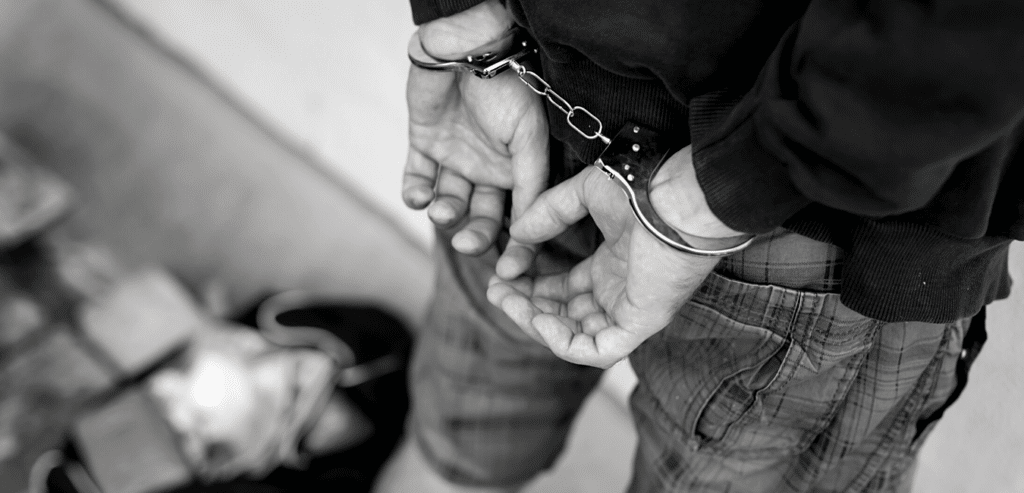
Drug Treatment for Clients With Dependency or Addiction Issues in NYC
For those clients who have real drug dependency or addiction issues, it is not surprising that they find themselves arrested and charged, perhaps any number of times, with a drug possession offense. Fortunately, there are programs available both through the courts and otherwise which may not only offer the type of treatment that could break the cycle of dependency but also could result in the reduction or even dismissal of narcotics possession charges. This may even be the case for someone with a felony narcotics conviction on their record. But the requirements to be admitted to these diversion programs and the dangers to the accused should they fail to successfully complete the program may not always be the right solution to a drug possession case. Drug Courts and the guilty pleas which they often require for entry are not the answer for everyone. Having the right drug possession attorney familiar with the law in the Manhattan, Brooklyn, Bronx, and Queens area to assist you and your family in weighing your options is absolutely critical.
Contact the top NYC Drug Possession Lawyer Today
For anyone charged with drug possession crimes in NYC, it is important that you have the best counsel fighting for you in court. For high-quality representation from the top NYC drug possession lawyer, give Fred Sosinsky a call.
SOS? CONTACT SOSINSKY



NYC Criminal Defense
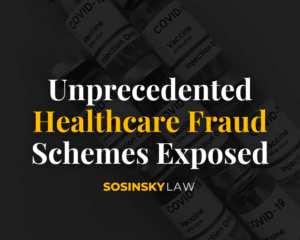
Unprecedented Healthcare Fraud Schemes Exposed
Unprecedented Healthcare Fraud Schemes Exposed: A Glimpse into the Recent DOJ Crackdown In a groundbreaking move, the Department of Justice has unveiled criminal charges against
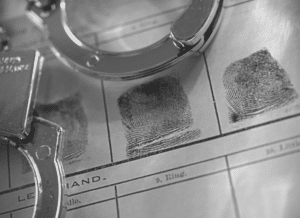
Conspiracy Charges in NY
NYC Conspiracy Crime Lawyer Conspiracy charges in NY are valid when two or more parties make a clear agreement to engage in criminal activity. Under
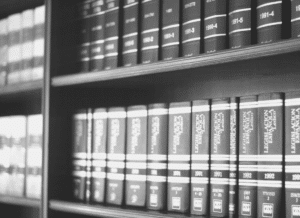
Federal Crimes Vs. State Crimes
Acts which are illegal under the laws of the United States federal government are known as federal crimes or federal offenses. Federal crimes are different

